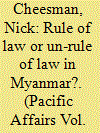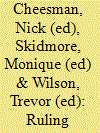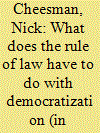| Srl | Item |
| 1 |
ID:
092199


|
|
|
|
|
| Publication |
2009-2010.
|
| Summary/Abstract |
The rhetorical force of the rule of law is acknowledged through official discourse in Myanmar just as it is in other countries across Asia and around the world. Given that Myanmar manifestly does not conform to substantive models of the rule of law, which are associated with democratic government and individual liberties, might it conform to a minimalist one? Is there in Myanmar a thin rule of law to which the military government can lay claim, one compatible even with grave abuses of human rights? Or is there only "un-rule of law"? Beginning with some theoretical concerns, this article passes briefly through a review of law and rule-of-law rhetoric in the country's modern history before arriving at the present day. It recounts a court case arising from a recent historic event, the September 2007 antigovernment protests, to query whether or not a thin rule of law can, in Myanmar at least, be said to coexist with authoritarian rule. It concludes that it cannot. But if the army in Myanmar has succeeded in overwhelming the courts at cost of the rule of law, ironically in doing this it may also have averted a worse scenario, one in which the denial of fundamental rights for which it is well known could be even greater than at present.
|
|
|
|
|
|
|
|
|
|
|
|
|
|
|
|
| 2 |
ID:
144227


|
|
|
|
|
| Summary/Abstract |
These days the rule of law is often invoked in Burma. Although its contemporary salience is partly a consequence of recent global trends, the rule of law also has lineages in the country's colonial and early post-colonial periods. To examine these lineages, this article distinguishes between its procedural and substantive conceptions. Whereas the latter conception recognizes the subjects of law as freely associating equals, the former is compatible with a range of political practices, including those that are undemocratic. The records of decisions in criminal cases before Burma's superior courts during the period of British domination suggest that some semblance of procedural rule of law did exist, and that it was compatible with the rule of colonial difference. Out of this procedural rule of law a nascent, substantive type emerged during the early years of democratic life in the post-colony, before the onset of military dictatorship. The article concludes that more effort to structure interpretations of the rule of law in history might better enable discussion about the concept's continued relevance.
|
|
|
|
|
|
|
|
|
|
|
|
|
|
|
|
| 3 |
ID:
104382


|
|
|
|
|
| Publication |
Singapore, ISEAS, 2010.
|
| Description |
vi, 353p.
|
| Standard Number |
9789814311465
|
|
|
|
|
|
|
|
|
|
|
|
Copies: C:1/I:0,R:0,Q:0
Circulation
| Accession# | Call# | Current Location | Status | Policy | Location |
| 055977 | 320.9591/CHE 055977 | Main | On Shelf | General | |
|
|
|
|
| 4 |
ID:
133124


|
|
|
|
|
| Publication |
2014.
|
| Summary/Abstract |
Talk of the rule of law is today ubiquitous in Myanmar. But what does the rule of law mean? And what does it have to do with the country's nascent democratization? One way to conceptualize the rule of law is in terms of substantive legal equality. Burmese farmers and activists mobilizing through the lexicon of law to defend agricultural land against intrusive state projects engage with the rule of law in this sense. Another way is as a language of public and state security. Demands for the rule of law in response to violence in Myanmar's west correspond with this usage. Whereas in established democracies the rule of law as equality complements the rule of law as security, in a democratizing state the two are not necessarily compatible. The rule of law as an idea associated with substantive legal equality contributes to Myanmar's democratization, whereas when associated with public and state security it potentially undermines that democratization.
|
|
|
|
|
|
|
|
|
|
|
|
|
|
|
|